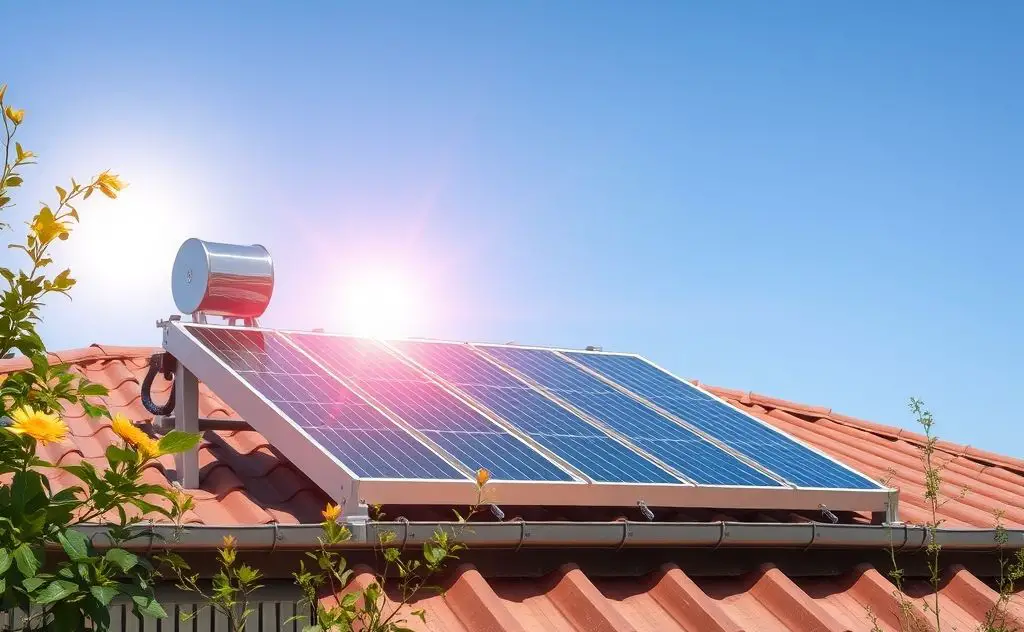The most efficient solar air heater uses advanced materials and design to maximize heat absorption and minimize heat loss, significantly enhancing energy performance.
Solar air heaters harness free solar energy to provide supplemental home heating, reducing energy costs by 30-50%. These systems work by capturing sunlight through a glazed panel, heating air that circulates through an absorber, and delivering warm air to your living space.

Key Components of High-Efficiency Solar Air Heaters
All effective solar air heaters share these essential components:
- Insulated Frame: Typically 4’x8′ with 3-4″ depth using 1×6 or 2×6 lumber
- Back Insulation: 1-2″ rigid foam to minimize heat loss
- Absorber Plate: Matte black painted metal that converts sunlight to heat
- Glazing: Polycarbonate or glass front panel that traps heat
Air Flow Systems
Two primary methods move heated air:
- Thermosyphon (Passive): Uses natural convection – no fans needed
- Forced Air (Active): Uses thermostatically-controlled fans for better circulation

Top 3 Most Efficient Solar Air Heater Designs
1. Corrugated Metal Absorber Design
This simple yet effective design uses:
- Corrugated metal roofing panels as the absorber
- Air channels between panel ridges
- Can achieve 120-140°F output temperatures
2. Perforated Absorber with Heat Exchanger
More advanced design features:
- Perforated metal plate allows air to pass through
- Secondary heat exchanger increases efficiency
- Maintains 140-160°F output with proper airflow
3. Glazed Collector with Thermal Mass
Premium performance system includes:
- Double-glazed front panel
- Thermal mass (stones or water tubes) for heat storage
- Can provide heat even after sunset
Performance Comparison
| Design Type | Max Temp (°F) | CFM Airflow | Efficiency |
|---|---|---|---|
| Corrugated Metal | 140 | 40-60 | 45-55% |
| Perforated Plate | 160 | 30-50 | 55-65% |
| Thermal Mass | 130 | 20-40 | 60-70% |
Installation Tips for Maximum Efficiency
Optimal Placement
Install solar air heaters on south-facing walls or roofs at an angle equal to your latitude plus 15° for winter performance. Vertical mounting works well in northern climates.
Ductwork Considerations
Use insulated ducts to minimize heat loss. Keep runs as short and straight as possible. For more on efficient heating systems, see our guide on built-in gas heaters that can complement solar systems.
Automatic Controls
Install a thermostat-controlled fan and backdraft damper to prevent reverse airflow at night. Consider integrating with your existing HVAC system.
Advanced Efficiency Features
For those seeking maximum performance:
- Selective Surface Coatings: Special paints that absorb more sunlight while emitting less infrared radiation
- Vacuum Tubes: Ultra-efficient but more expensive collector technology
- Phase Change Materials: Stores 5-14x more heat than water or rock per unit volume
Maintenance for Long-Term Performance
Keep your solar air heater working efficiently with:
- Annual cleaning of glazing surfaces
- Checking and replacing insulation as needed
- Inspecting seals and weatherstripping
- Testing fan operation and thermostat controls
For related heating solutions, explore our review of the XtremepowerUS solar pool heater which uses similar technology for water heating.
Real-World Performance Data
Field tests by U.S. Department of Energy show properly sized solar air heaters can provide 30-60% of seasonal heating needs in moderate climates. Performance varies based on:
- Solar resource availability
- Collector size and efficiency
- Building heat loss characteristics
According to NREL research, the most efficient commercially available solar air collectors achieve thermal efficiencies of 70-80% under ideal conditions.
